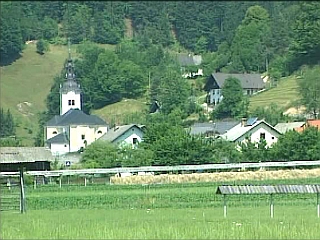
The landscape of Selška Valley – with its widely scattered homesteads, a few snug villages, and a hodgepodge of fields, orchards, and forests – may look typically Slovenian at first glance. For the most part, it is only the Germanic sound of common family names in the valley that hints to the area’s colorful history.
In the Middle Ages, parts of the valley were populated by Slovenian speakers, but the population density was low, and depopulation threatened the survival of many homesteads. As a result, the Bishops of Freising, who owned the local land, decided to settle the area with outsiders.
Among them were settlers from what is now South Tyrol, who began to arrive in the 13th century. Most of them came from the mountainous Innichen area and were chosen to settle in the Selška Valley because they had experience farming on steep terrain, much like the one found in their new homeland. The German-speaking settlers turned out to be the perfect farming workforce for the landed gentry, and their numbers continued to increase through the years, even though the planned colonization began to slow by the 14th century.
The settlers brought their German dialect with them. Through the years, it developed its own unique characteristics under the influence of surrounding Slovenian dialects. Ultimately, the pressures of assimilation proved to be too much, and by the early 20th century, Slovenian had replaced German throughout the valley. Any sense of German ethnic identity is also long gone and the locals consider themselves to be Slovenian.
Still, the local speech retains a number of German words and phrases. Even more conspicuous are typically German family names in the valley, Šmid (Schmidt), Thaler, Gajger (Geiger), Frelih (Froelich), and so on – as well as the style of local folk architecture, which, according to historian Miha Markelj, incorporates many typically Tyrolean elements.
The ancient link is also evident in a local tradition: Well into the 20th century, residents of the village of Sorica made regular pilgrimages to South Tyrol and donated candles and contributions to the church in the town of Innichen, from where their ancestors came to Slovenia many centuries ago. Recently, a group of local cyclists and runners from Sorica made a journey to the Tyrolean town – in an effort to revive an old tradition and to celebrate their heritage.

































































